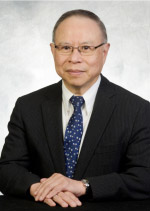Endometriosis Awareness Month
At 29 years old, newly married Caroline Leroux* was looking forward to starting a family. But just two months after she stopped taking the pill, she experienced excruciating pain and cramps in her abdomen.
Leroux’s physician ultimately referred her to Dr. Togas Tulandi, a specialist at the McGill University Health Centre (MUHC) Reproductive Centre.
Dr. Tulandi diagnosed Leroux with stage 4 endometriosis. ”This occurs when cells from the uterus are located outside the uterus,” he explains. “These cells build up and shed according to the monthly hormonal cycles. They cause swelling and inflammation. This leads to the development of scar tissue (or adhesions) around the ovaries, the Fallopian tubes and the uterus.”
 The most common symptom of endometriosis is pain that occurs prior to, during or after menstruation, during intercourse, during urination or during bowel movements. In some cases, the pain can be severe and disabling, while in other cases, women will have very mild or no symptoms. It is often difficult to diagnose as it mimics many other possible conditions, including Irritable Bowel Syndrome. Many patients are first diagnosed in their late twenties and early thirties when they consult a physician for menstrual pain or infertility.
The most common symptom of endometriosis is pain that occurs prior to, during or after menstruation, during intercourse, during urination or during bowel movements. In some cases, the pain can be severe and disabling, while in other cases, women will have very mild or no symptoms. It is often difficult to diagnose as it mimics many other possible conditions, including Irritable Bowel Syndrome. Many patients are first diagnosed in their late twenties and early thirties when they consult a physician for menstrual pain or infertility.
According to the Society of Obstetricians and Gynecologists of Canada, endometriosis affects up to 1 in 10 women of reproductive age, 5 in 10 women who are experiencing infertility, and 5 in 10 women with chronic pelvic pain. The good news is that it can be treated.
Treatment options depend on a patient’s age, the severity of the symptoms, and whether the patient wants to have children. Since endometriosis is estrogen dependent, the key is to stabilize the hormones. “The hormones in pregnancy will suppress the endometriosis,” explains Dr. Tulandi. “We know that the condition improves if you get pregnant.”
For someone with mild endometriosis who is not trying to get pregnant, the first line of treatment is usually to prescribe birth control pills. This stabilizes the natural hormone levels and reduces the pain associated with endometriosis. Pain relief medication may also be prescribed if needed. Other hormonal treatment options are available too, such as using gonadotropin releasing hormone agonist medications, like Lupron, but since these mimic menopausal side effects, they are generally used on a short-term basis. Another medical treatment is progesterone.
In order to reduce pain, slow the condition’s progress, and increase the chances of becoming pregnant, Dr. Tulandi performed laparoscopic surgery on Leroux. This minimally-invasive procedure involved inserting small surgical instruments through tiny incisions to remove the visible endometriosis implants and scar tissue which had formed around the uterus, tubes and ovaries. The recovery time for minimally-invasive surgery is much shorter than with more invasive procedures. Leroux was able to return to work only two weeks after her surgery.
“I was feeling very frightened and anxious, and worried that I wouldn’t be able to have children,” says Leroux. “Dr. Tulandi was so nice to me and helped me through this scary situation.” Four months after her surgery, Leroux was pregnant and she went on to deliver a beautiful, healthy baby boy who is now almost two years old.
*Caroline Leroux is not the patient’s real name as she preferred to remain anonymous.
For more information regarding endometriosis, please visit:
Endometriosis Pictures Slideshow: A Visual Guide to Symptoms, Stages and Treatments
http://www.medicinenet.com/endometriosis_pictures_slideshow/article.htm
 Dr. Togas Tulandi
Dr. Togas TulandiMD, MHCM, FRCSC, FACOG
Dr. Togas Tulandi is Director, Division of Minimally Invasive Gynecologic Surgery at the McGill University Health Centre. He is also Professor and Academic Vice Chairman of Obstetrics and Gynecology, Milton Leong Chair in Reproductive Medicine at McGill University.
He is an internationally known endoscopic surgeon, specializing in reproductive endocrinology and infertility and a pioneer in advanced endoscopic operations. As an established researcher, he has authored over 300 articles, over 60 book chapters, and 12 books.
Dr. Tulandi will be speaking at the upcoming World Symposium of Endometriosis from March 27 – 29, 2014 in Atlanta and is on the committee of the World Congress of Endometriosis that will take place in Vancouver in 2017.


